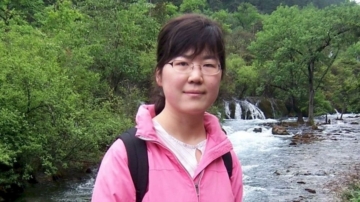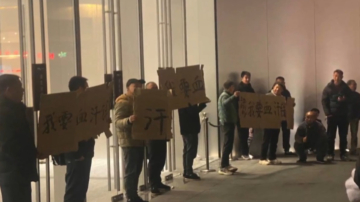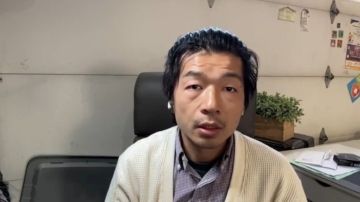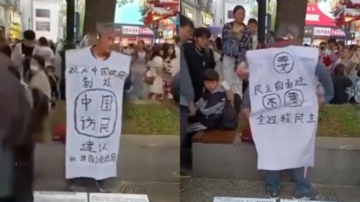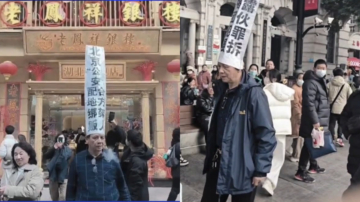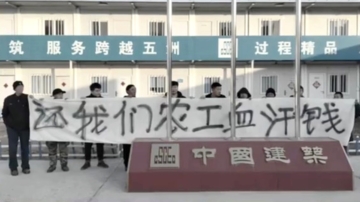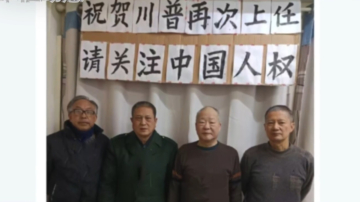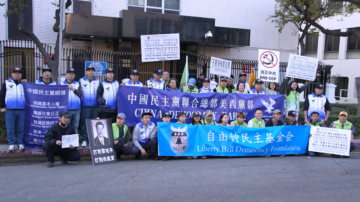【新唐人2013年11月04日讯】广东省新闻出版广电局就“陈永洲事件”对《新快报》作出查处决定后,作为母报的《羊城晚报》集团,立即对《新快报》展开“大换血”,不但《新快报》社长、总编、副总编全部遭到免职,其他班子成员也被部分调整。此外,广电局还要求全省媒体以此为戒。业界人士担心,中共当局会藉机打压“不听话”的《南方》报系,甚至“清洗”全国新闻界。
《羊城晚报》集团11月 1号发出通告,免去《新快报》社长兼总编辑李宜航,和副总编辑马东瑾两人职务,由《羊城晚报》报业集团党委书记刘红兵兼任《新快报》社长,《羊城晚报》社委孙璇则兼任《新快报》总编辑,《羊城晚报》要闻部副主任陶勇兼任副总编辑。
在此之前,广东省新闻出版广电局和省新闻工作者协会联合发出通知,要求全省媒体对《新快报》记者陈永洲一事引以为戒,坚决处理和举报所谓虚假报导、有偿新闻和新闻敲诈等行为。
《新快报》遭到如此“大换血”,以及,广东当局对这一事件的“严厉”态度,使得广东新闻界一时间风声鹤唳,集体噤声。有媒体人士分析,当局极有可能借《新快报》事件,全面整肃《南方》报系,甚至全国新闻界中的所谓“异己分子”。
原《大公报》《大周刊》主笔兼新闻部主任朱健国:“这次弄《新快报》,不是为了《新快报》,也不是为了抓那个记者,它是制造一个突破口,寻找一个理由、一个契机来全面的整肃《南方》报系。广东的媒体一直要比内地的媒体敢于说话,那么现在北京要重新收紧,要搞一言堂,禁止自由报导,那么就要从广东先开刀。”
巧合的是,就在陈永洲被跨省刑拘的前几天,中共国家新闻出版广电总局宣布,全国25万名新闻采编人员,将在明年初统一换发新版的新闻记者证。记者必须接受为期一个半月的“岗位培训和考核”,考核合格才能获得新记者证。而“培训”内容包括﹕“中国特色社会主义”、“马克思主义新闻观”、以及增进记者对“国家大政方针的认同”等内容。当局这一规定又被舆论称为“国考洗脑”。
网民纷纷谴责中共企图“清理”意识形态,和控制新闻媒体的舆论导向。
朱健国:“这个不是它广东要做的,这是北京早已部署的一个战略任务。全国25万记者全部要更换记者证,那么就是全国的记者都要来个大清洗、大换血。把那些不信‘共产主义’,不愿回到马列这条轨道上的人都要清洗出去,它就是这么一种趋势。”
“南方报系”,最早是对《南方周末》、《南方都市报》、《21世纪经济报导》、《21世纪环球报导》、《新京报》等南方报业旗下刊物的总称,后来部分人士将《羊城晚报》、《蘋果日报》等媒体也加入其中。
因为敢言,“南方报系”又被孔庆东、方舟子及毛左们批为“汉奸媒体”、“反动媒体”,十多年来遭到当局近20次的整肃,期间多个刊物遭停刊或是被剥离,多名记者、总编被降职、免职甚至判刑。包括﹕2003年总编辑程益中因率先曝光SARS疫情,被降职处理﹔2004年1月,总经理喻华峰、编辑程益中等四人,被广州执法部门以经济犯罪之名逮捕判刑﹔今年1月,《南方周末》新年献词遭窜改,引发轩然大波等。
大陆媒体人曾感叹,中国媒体生态的艰难险恶只有身在其中才能体会,要么就“顾全大局”、掩耳盗铃,掩盖一切真相﹔要么就出卖新闻良知做虚假报导。即使有看似正义反腐的报导,也是高层权斗操控下的产物。总之,媒体人想真正报导真相、或起到新闻监督的作用,一定会备受打压甚至付出惨重代价。
采访/ 易如 编辑/ 张天宇 后制/葛雷
Nationwide Media Cleanup Possible As Xin Kuai Bao’s
Old Leaders Dismissed
Guangdong Provincial Administration of Press, Publication,
Radio, Film and Television (APPRFT) announced its intention
to punish the Xin Kuai Bao over Chen Yongzhou’s incident.
The newspaper’s parent company Yangcheng Evening News
Group immediately made big changes to the Xin Kuai Bao’s leading heads.
Not only were the editor-in-chief and vice editor-in-chief
dismissed, personnel adjustments were also made
to other positions inside the newspaper.
Guangdong’s APPRFT also called on all its media
organizations to “learn the lesson” from the incident.
Insiders now worry that the Chinese Communist party (CCP)
will take the opportunity to suppress Southern Newspaper Group,
or even the whole media industry in China.
On November 1st, the Yangcheng Evening News Group
announced that the Xin Kuai Bao’s president and editor-
in-chief Li Yihang together with vice editor-in-chief Ma
Dongjin were removed from their posts.
Liu Hongbing, the party secretary of the News Group will
concurrently work as the new president.
Sun Xuan, a committee member of Yangcheng Evening News
Board, will take the concurrent role of the editor-in-chief.
Tao Yong, the vice director of Yangcheng Evening News’
Top-News Department, will concurrently work as
the new vice editor-in-chief.
Right before that, Guangdong’s APPRFT and Provincial All
Journalists Association made a joint announcement.
They require all media organizations in Guangdong to learn
the lesson from Chen Yongzhou’s incident and step up
efforts against fabrication, paid news and blackmailing.
The dismissal of the Xin Kuai Bao’s leaders and local CCP
harsh attitude toward the incident has already generated a
chilling effect over all media in Guangdong.
Some media workers speculate the CCP will probably have an
all-round crackdown on Southern Newspaper Media Group.
This suppression may be even extended against
all “dissidents” among China’s media.
Zhu Jianguo, former news director at Hong Kong-based
Ta Kung Pao: “The suppression over the Xin Kuai Bao is
not only to punish the newspaper or that journalist.
Indeed the CCP is trying to find a chance or an excuse to
start an overall crackdown on Southern Newspaper Group.
The media in Guangdong is always braver in speaking than
inland media.
Now the party leaders in Beijing want to tighten the control
over free reporting leaving only its own voice to be heard.
So it chooses Guangdong’s media as the first target.”
Coincidentally, just several days before Chen Yongzhou
was arrested, the CCP’s State APPRFT announced that all
250,000 Chinese reporters would be issued a new press
pass in early 2014.
To get the pass, reporters have to attend a half-month of
“journalists’ professional trainings” passing a qualifying exam.
The training contents include subjects such as “Socialism
with Chinese Characteristics”, “Marxist View of Journalism”,
“Journalism Ethics”, as well as materials aiming at improving
reporters’ “ideological identity” with the party’s policies.
It is being called a “brainwashing national exam”
by media workers.
Many Chinese netizens have criticized the CCP’s attempt at
cleaning up different ideologies and controlling the “main
direction” of media reports.
Zhu Jianguo:”It is not Guangdong’s authority that
makes the commands.
This is a strategic task given by Beijing long time ago.
All 250,000 reporters in China have to renew
their press passes.
This is simply a large-scale cleanup of all Chinese journalists.
Those who don’t believe in Communism or return to
the track of Marxism will be eliminated.
That is what the CCP plans to do.”
Originally, the Southern Newspaper Group was a general
name for Southern Weekly, Southern Metropolis Daily,
21st Century Business Herald, 21st Century World Herald
and Beijing News.
They are all attached to Sourthern Newspaper Media Group.
Later some also included Yangcheng Evening News
and Apple Daily into this group.
Because of its daring to speak up, the Southern Newspaper
Group is called “Traitor Media” or “Reactionary Media” by
leftists such as Kong Qingdong and Fang Zhouzi.
It has suffered political cleanup almost 20 times over
the past ten years.
During this period many publications were forcibly closed
down or detached from the group.
Quite a few journalists and editors-in-chief were downgraded,
fired or even convicted.
Examples are: editor-in-chief Cheng Yizhong was downgraded
as he first revealed the outbreak of SARS in 2003.
Cheng Yizhong, a general manager Yu Huafeng and two others
were arrested and convicted in January 2004 on charges
of economic crimes.
In January 2013, Southern Weekly’s New Year special editorial
was changed by the propaganda department.
This made a big dispute.
Some Chinese media workers always say that, you can only
learn how bad Chinese media environment by working there.
You have to “consider the overall situation” and hide the
truth by deceiving yourself, or make false reports which
betrays your professional conscience.
Even those apparent justice reports of anti-corruption are
only products of power-struggles among the party leaders.
Anyone who wants to report real news or act as media
supervisor of the society will definitely be suppressed.
They may even have to pay a heavier price
in many cases.
《羊城晚报》集团11月 1号发出通告,免去《新快报》社长兼总编辑李宜航,和副总编辑马东瑾两人职务,由《羊城晚报》报业集团党委书记刘红兵兼任《新快报》社长,《羊城晚报》社委孙璇则兼任《新快报》总编辑,《羊城晚报》要闻部副主任陶勇兼任副总编辑。
在此之前,广东省新闻出版广电局和省新闻工作者协会联合发出通知,要求全省媒体对《新快报》记者陈永洲一事引以为戒,坚决处理和举报所谓虚假报导、有偿新闻和新闻敲诈等行为。
《新快报》遭到如此“大换血”,以及,广东当局对这一事件的“严厉”态度,使得广东新闻界一时间风声鹤唳,集体噤声。有媒体人士分析,当局极有可能借《新快报》事件,全面整肃《南方》报系,甚至全国新闻界中的所谓“异己分子”。
原《大公报》《大周刊》主笔兼新闻部主任朱健国:“这次弄《新快报》,不是为了《新快报》,也不是为了抓那个记者,它是制造一个突破口,寻找一个理由、一个契机来全面的整肃《南方》报系。广东的媒体一直要比内地的媒体敢于说话,那么现在北京要重新收紧,要搞一言堂,禁止自由报导,那么就要从广东先开刀。”
巧合的是,就在陈永洲被跨省刑拘的前几天,中共国家新闻出版广电总局宣布,全国25万名新闻采编人员,将在明年初统一换发新版的新闻记者证。记者必须接受为期一个半月的“岗位培训和考核”,考核合格才能获得新记者证。而“培训”内容包括﹕“中国特色社会主义”、“马克思主义新闻观”、以及增进记者对“国家大政方针的认同”等内容。当局这一规定又被舆论称为“国考洗脑”。
网民纷纷谴责中共企图“清理”意识形态,和控制新闻媒体的舆论导向。
朱健国:“这个不是它广东要做的,这是北京早已部署的一个战略任务。全国25万记者全部要更换记者证,那么就是全国的记者都要来个大清洗、大换血。把那些不信‘共产主义’,不愿回到马列这条轨道上的人都要清洗出去,它就是这么一种趋势。”
“南方报系”,最早是对《南方周末》、《南方都市报》、《21世纪经济报导》、《21世纪环球报导》、《新京报》等南方报业旗下刊物的总称,后来部分人士将《羊城晚报》、《蘋果日报》等媒体也加入其中。
因为敢言,“南方报系”又被孔庆东、方舟子及毛左们批为“汉奸媒体”、“反动媒体”,十多年来遭到当局近20次的整肃,期间多个刊物遭停刊或是被剥离,多名记者、总编被降职、免职甚至判刑。包括﹕2003年总编辑程益中因率先曝光SARS疫情,被降职处理﹔2004年1月,总经理喻华峰、编辑程益中等四人,被广州执法部门以经济犯罪之名逮捕判刑﹔今年1月,《南方周末》新年献词遭窜改,引发轩然大波等。
大陆媒体人曾感叹,中国媒体生态的艰难险恶只有身在其中才能体会,要么就“顾全大局”、掩耳盗铃,掩盖一切真相﹔要么就出卖新闻良知做虚假报导。即使有看似正义反腐的报导,也是高层权斗操控下的产物。总之,媒体人想真正报导真相、或起到新闻监督的作用,一定会备受打压甚至付出惨重代价。
采访/ 易如 编辑/ 张天宇 后制/葛雷
Nationwide Media Cleanup Possible As Xin Kuai Bao’s
Old Leaders Dismissed
Guangdong Provincial Administration of Press, Publication,
Radio, Film and Television (APPRFT) announced its intention
to punish the Xin Kuai Bao over Chen Yongzhou’s incident.
The newspaper’s parent company Yangcheng Evening News
Group immediately made big changes to the Xin Kuai Bao’s leading heads.
Not only were the editor-in-chief and vice editor-in-chief
dismissed, personnel adjustments were also made
to other positions inside the newspaper.
Guangdong’s APPRFT also called on all its media
organizations to “learn the lesson” from the incident.
Insiders now worry that the Chinese Communist party (CCP)
will take the opportunity to suppress Southern Newspaper Group,
or even the whole media industry in China.
On November 1st, the Yangcheng Evening News Group
announced that the Xin Kuai Bao’s president and editor-
in-chief Li Yihang together with vice editor-in-chief Ma
Dongjin were removed from their posts.
Liu Hongbing, the party secretary of the News Group will
concurrently work as the new president.
Sun Xuan, a committee member of Yangcheng Evening News
Board, will take the concurrent role of the editor-in-chief.
Tao Yong, the vice director of Yangcheng Evening News’
Top-News Department, will concurrently work as
the new vice editor-in-chief.
Right before that, Guangdong’s APPRFT and Provincial All
Journalists Association made a joint announcement.
They require all media organizations in Guangdong to learn
the lesson from Chen Yongzhou’s incident and step up
efforts against fabrication, paid news and blackmailing.
The dismissal of the Xin Kuai Bao’s leaders and local CCP
harsh attitude toward the incident has already generated a
chilling effect over all media in Guangdong.
Some media workers speculate the CCP will probably have an
all-round crackdown on Southern Newspaper Media Group.
This suppression may be even extended against
all “dissidents” among China’s media.
Zhu Jianguo, former news director at Hong Kong-based
Ta Kung Pao: “The suppression over the Xin Kuai Bao is
not only to punish the newspaper or that journalist.
Indeed the CCP is trying to find a chance or an excuse to
start an overall crackdown on Southern Newspaper Group.
The media in Guangdong is always braver in speaking than
inland media.
Now the party leaders in Beijing want to tighten the control
over free reporting leaving only its own voice to be heard.
So it chooses Guangdong’s media as the first target.”
Coincidentally, just several days before Chen Yongzhou
was arrested, the CCP’s State APPRFT announced that all
250,000 Chinese reporters would be issued a new press
pass in early 2014.
To get the pass, reporters have to attend a half-month of
“journalists’ professional trainings” passing a qualifying exam.
The training contents include subjects such as “Socialism
with Chinese Characteristics”, “Marxist View of Journalism”,
“Journalism Ethics”, as well as materials aiming at improving
reporters’ “ideological identity” with the party’s policies.
It is being called a “brainwashing national exam”
by media workers.
Many Chinese netizens have criticized the CCP’s attempt at
cleaning up different ideologies and controlling the “main
direction” of media reports.
Zhu Jianguo:”It is not Guangdong’s authority that
makes the commands.
This is a strategic task given by Beijing long time ago.
All 250,000 reporters in China have to renew
their press passes.
This is simply a large-scale cleanup of all Chinese journalists.
Those who don’t believe in Communism or return to
the track of Marxism will be eliminated.
That is what the CCP plans to do.”
Originally, the Southern Newspaper Group was a general
name for Southern Weekly, Southern Metropolis Daily,
21st Century Business Herald, 21st Century World Herald
and Beijing News.
They are all attached to Sourthern Newspaper Media Group.
Later some also included Yangcheng Evening News
and Apple Daily into this group.
Because of its daring to speak up, the Southern Newspaper
Group is called “Traitor Media” or “Reactionary Media” by
leftists such as Kong Qingdong and Fang Zhouzi.
It has suffered political cleanup almost 20 times over
the past ten years.
During this period many publications were forcibly closed
down or detached from the group.
Quite a few journalists and editors-in-chief were downgraded,
fired or even convicted.
Examples are: editor-in-chief Cheng Yizhong was downgraded
as he first revealed the outbreak of SARS in 2003.
Cheng Yizhong, a general manager Yu Huafeng and two others
were arrested and convicted in January 2004 on charges
of economic crimes.
In January 2013, Southern Weekly’s New Year special editorial
was changed by the propaganda department.
This made a big dispute.
Some Chinese media workers always say that, you can only
learn how bad Chinese media environment by working there.
You have to “consider the overall situation” and hide the
truth by deceiving yourself, or make false reports which
betrays your professional conscience.
Even those apparent justice reports of anti-corruption are
only products of power-struggles among the party leaders.
Anyone who wants to report real news or act as media
supervisor of the society will definitely be suppressed.
They may even have to pay a heavier price
in many cases.

